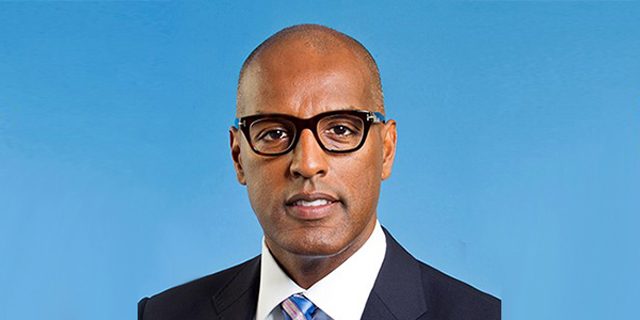The pandemic has “unleashed both a global health emergency and an unprecedented economic crisis of historic magnitude,” unbudgeted Covid-19 expenditures for this fiscal year are estimated to be $70-$80 million, and Covid-19 will also cause a major decline in Government revenues, Minister of Finance Curtis Dickinson said.
Speaking in the House of Assembly today [May 8], Minister Dickinson provided an update on the Ministry of Finance COVID-19 Fiscal Plan “which was formulated to address the systemic effects that the COVID-19 Pandemic is having on the economy of Bermuda and by extension Government’s finances.”
The Minister said, “The debt ceiling was raised by $150 million to $2.9 billion during the final sitting of the House of Assembly and at this time net debt stands at $2.68 billion leaving the Government with approximately $220 million of borrowing capacity.
“Additionally, the Ministry has executed a $20 million credit facility with a local financial institution and is in the process of finalizing another $150 million facility with that and another local financial institution.
“This borrowing capacity, together with current cash reserves and on-going tax receipts will assist the Government in taking the appropriate actions to mitigate the impact of COVID-19 in the short-term.
“To assist people out of work due to the economic impact of COVID-19, the Government has quickly introduced an unemployment benefit,” the Minister said. “As of last Friday, the government has processed payments totaling approximately $15.6 million.”
“The Ministry of Finance provided increased emergency funding of $2.8 million to the Ministry of Health to fund, among other things, personal protective equipment, testing kits and testing equipment.
“Additional funding has also been provided to the Ministry of National Security in the amount of $450,000, to fund costs associated with the embodiment of the regiment, and to provide quarantine facilities. A further $171,000 has been provided to the Ministry of Public Works, the Ministry of Legal Affairs and the Department of Information and Digital Technology for other COVID-19 related matters.
“Coronavirus has put the world economy at risk. The pandemic has unleashed both a global health emergency and an unprecedented economic crisis of historic magnitude.
“Based on submissions by Ministries and Ministry of Finance projections, unbudgeted Covid-19 expenditures for this fiscal year are estimated to be in the range of $70-$80 million and consist of the following:
- $20 million estimated for the Ministries of Health, National Security, Legal Affairs, Public Works and the Cabinet Office Departments;
- $44 million estimated for expenditure on Unemployment Benefits;
- $12 million grant to the Bermuda Economic Development Corporation;
- $10 million estimate for possible call on airport minimum revenue guarantee.
“Covid-19 will also cause a major decline in Government revenues. This is caused both directly by the economic slowdown and indirectly by tax policy and administration measures taken in response. The Ministry estimates that revenue yields for 2020/21 could contract in the range of $175-$200 million.
“After factoring in the impact of Covid-19, the revised deficit for 2020/21 is estimated to be in the range of $275-$315 million. This level of deficit is not only unsustainable but economically and fiscally imprudent. When considering the current high level of public debt, the Ministry of Finance regards this level of deficit as a serious challenge.
“I am all too conscious of the significance of our debt rating and the impact of a potential rating downgrade. Therefore, we must be judicious in the use of additional debt and keep an ongoing active dialogue with the rating agencies. Accordingly, the Ministry’s target is to keep the deficit for 2020/21 below $175 million.
“The Ministry of Finance Covid-19 Fiscal Plan calls for a reexamination and reduction of lower priority budget expenditures to ensure that spending needed for Covid-19 matters are maintained and the deficit is contained within a level to maintain credibility with the rating agencies and investors. Accordingly, savings are being identified in the following areas:
- Delay for an additional six months the start of any capital projects that have not commenced;
- Continue the freeze on the funding of vacant post that are not required to address Covid-19 or to protect Bermuda’s national interests; Continue the ban on non-essential government travel; and
- Reduce all discretionary spending including grants, consultancy, training, materials and supplies, clothing and uniforms etc.
“To reduce the deficit further, other temporary payroll or government employee overhead savings will have to be considered.
“On Monday May 5th the Government held discussions with our union partners at which time the Ministry of Finance made a presentation on the economic and fiscal situation facing our country. These talks were fruitful and I am convinced that all parties understand the need to collaborate to develop solutions to the fiscal challenges that we are dealing with.
“Through the initiative mentioned above, the Government has already identified an estimated $50-$60 million in potential savings and we are looking forward to working with our union partners to identify even more.
“With every threat there is an opportunity. Therefore, the Covid-19 crisis must be seen as ‘an opportunity for a profound shift’. Any Covid-19 reform programme must be multipronged. It is also important that this plan be far-reaching, comprehensive and supported by a broadly-based consensus across all the key stakeholders, including the trade unions and church groups. However difficult it may be, opting out from taking tough decisions at this time is no longer an option.
“When you consider the long view, Bermuda has been in business for 500 years. Our legacy is a strong and vibrant one. Our people and many of our businesses are resilient and strong in character. I am confident that if we all work together Bermuda and her people will emerge from this crisis stronger.”
The Minister’s full statement follows below:
Mr. Speaker, before delivering update remarks on the Government’s COVID- 19 Fiscal plan, I would like to offer my condolences to the families of those who have lost loved ones to this pandemic. I would also like to thank all of our front-line workers who are out there daily, working hard, battling this pandemic, providing vital services; protecting our health and well-being, and keeping our island functioning. We are grateful for your dedication and commitment and especially your bravery.
Mr. Speaker, I rise this morning to provide this Honourable House with an update on the Ministry of Finance COVID-19 Fiscal Plan which was formulated to address the systemic effects that the COVID-19 Pandemic is having on the economy of Bermuda and by extension Government’s finances.
Honourable Members will recall that on March 16th 2020, I advised this Honourable House on the actions being taken as part of the Ministry of Finance COVID-19 Fiscal Plan. These actions were as follows:
- To obtain emergency financing to supplement reduced revenues and additional COVID-19 related expenditures.
- To provide additional funding to assist Bermuda’s unemployed as a result of the economic impact of COVID-19.
- To curtail lower priority expenditures to ensure that spending needed for COVID-19 matters can be maintained.
Mr. Speaker, I also noted that no spending reductions would be made that would jeopardize the health, safety, and security of the people of Bermuda. Bermuda’s unemployed would be assisted, and fiscal prudence would be strictly maintained.
To support these initiatives, the debt ceiling was raised by $150 million to $2.9 billion during the final sitting of the House of Assembly and at this time net debt stands at $2.68 billion leaving the Government with approximately $220 million of borrowing capacity.
Additionally, the Ministry has executed a $20 million credit facility with a local financial institution and is in the process of finalizing another $150 million facility with that and another local financial institution.
This borrowing capacity, together with current cash reserves and on-going tax receipts will assist the Government in taking the appropriate actions to mitigate the impact of COVID-19 in the short-term.
Mr. Speaker, to assist people out of work due to the economic impact of COVID-19, the Government has quickly introduced an unemployment benefit.
The Ministry of Finance has worked closely with the Department of Workforce Development and our local banks to ensure that as soon as possible, money was available for unemployment benefits. We recognized that time was of the essence. We have responded quickly to this crisis and have used the tools and resources at our disposal in a meaningful way to provide much needed financial assistance to our people during this unprecedented time.
As of last Friday, the government has processed payments totaling approximately $15.6 million.
Mr. Speaker, in the recently concluded 2019/2020 fiscal year, the Ministry of Finance provided increased emergency funding of $2.8 million to the Ministry of Health to fund, among other things, personal protective equipment, testing kits and testing equipment.
Additional funding has also been provided to the Ministry of National Security in the amount of $450,000, to fund costs associated with the embodiment of the regiment, and to provide quarantine facilities. A further $171,000 has been provided to the Ministry of Public Works, the Ministry of Legal Affairs and the Department of Information and Digital Technology for other COVID-19 related matters.
Mr. Speaker, to assist businesses that have a pressing need for financial relief, on April 3, the Government announced that several temporary emergency measures were instituted, which included extending deadlines for tax filings and deferring or possibly waiving of fees, taxes, and penalties.
In many parts of the world, including Bermuda, the COVID-19 pandemic has negatively impacted companies of all kinds; small and medium sized enterprises, or “SMEs” have not been spared. Many SMEs’ business models depend on face to face contact and a physical location in order to drive their business models. With the actions required to address the current crisis including the recently concluded Shelter in Place Order, these businesses have suffered significantly, which has in some cases, resulted in job losses.
Mr. Speaker, SMEs are an essential part of the Bermuda economy. SMEs, through the operation of their businesses, help stimulate economic growth by providing employment opportunities. The Bermuda Economic Development Corporation [BEDC] has already taken action, including grants and loans guarantees, to support these businesses through COVID-19 and beyond. The Government will provide support in the amount of $12 million to enable the BEDC to provide resources to expand the programs now being run to assist small and medium sized enterprises.
Mr. Speaker, Coronavirus has put the world economy at risk. The pandemic has unleashed both a global health emergency and an unprecedented economic crisis of historic magnitude.
The economic impact of the pandemic public-health measures required to suppress Covid-19 is causing severe economic shocks in all directly affected economies, including Bermuda. Mounting economic indicators and opinions suggest that the economic hit will be considerably worse than the 2008/09 Global Financial Crisis.
Mr. Speaker, Honorable Members are advised that at a press conference on April 18, 2020 I advised the following:
- Considering the impact that Covid-19 could have on all sectors in the Bermuda economy and the projected level of unemployment, the Ministry of Finance, working with the Caribbean Regional Technical Assistance Centre [CARTAC], has revised our growth forecast from 1.0% to 2.0% per cent to -7.5% to -12.5%. [It is important to note that this was a preliminary projection, based on reasonable assumptions and was primarily dependent on how long, the intensive, but very necessary, suppression measures remained in force.]
- The IMF, in their World Economic Outlook on April 14th, have predicted the global economy will contract by 3% in 2020, and 5.9% in the US. More recently, IMF Managing Director Kristialina Georgieva has offered an updated assessment stating in an interview with the BBC “that 3% may be a more optimistic picture than reality produces.” Notably, for the first time in the IMF’s history, the organization now has a team of epidemiologists helping them in the development of macroeconomic projections.
- The economic impact of Covid-19 will also have severe knock-on effects on the 2020/21 Budget. The combination of lower fiscal revenues and higher public spending, is expected to cause the projected budget deficit of $19.8 million to increase.
Mr. Speaker, based on submissions by Ministries and Ministry of Finance projections, unbudgeted Covid-19 expenditures for this fiscal year are estimated to be in the range of $70-$80 million and consist of the following:
- $20 million estimated for the Ministries of Health, National Security, Legal Affairs, Public Works and the Cabinet Office Departments;
- $44 million estimated for expenditure on Unemployment Benefits;
- $12 million grant to the Bermuda Economic Development Corporation;
- $10 million estimate for possible call on airport minimum revenue guarantee.
Mr. Speaker, Covid-19 will also cause a major decline in Government revenues. This is caused both directly by the economic slowdown and indirectly by tax policy and administration measures taken in response. The Ministry estimates that revenue yields for 2020/21 could contract in the range of $175-$200 million.
After factoring in the impact of Covid-19, the revised deficit for 2020/21 is estimated to be in the range of $275-$315 million. This level of deficit is not only unsustainable but economically and fiscally imprudent. When considering the current high level of public debt, the Ministry of Finance regards this level of deficit as a serious challenge. Total net Government debt outstanding could rise to approximately $3.0 billion, which is $100 million above the current statutory debt ceiling of $2.9 billion.
Mr. Speaker, I am all too conscious of the significance of our debt rating and the impact of a potential rating downgrade. Therefore, we must be judicious in the use of additional debt and keep an ongoing active dialogue with the rating agencies. Accordingly, the Ministry’s target is to keep the deficit for 2020/21 below $175 million.
The previously mentioned Covid-19 budget figures assume that Government takes no actions with regard to reducing allocations approved in the 2020/21 Budget. However, Mr. Speaker, the Ministry of Finance Covid-19 Fiscal Plan calls for a reexamination and reduction of lower priority budget expenditures to ensure that spending needed for Covid-19 matters are maintained and the deficit is contained within a level to maintain credibility with the rating agencies and investors. Accordingly, savings are being identified in the following areas:
- Delay for an additional six months the start of any capital projects that have not commenced;
- Continue the freeze on the funding of vacant post that are not required to address Covid-19 or to protect Bermuda’s national interests; Continue the ban on non-essential government travel; and
- Reduce all discretionary spending including grants, consultancy, training, materials and supplies, clothing and uniforms etc.
To reduce the deficit further, other temporary payroll or government employee overhead savings will have to be considered.
Mr. Speaker, on Monday May 5th the Government held discussions with our union partners at which time the Ministry of Finance made a presentation on the economic and fiscal situation facing our country. These talks were fruitful and I am convinced that all parties understand the need to collaborate to develop solutions to the fiscal challenges that we are dealing with.
Mr. Speaker, through the initiative mentioned above, the Government has already identified an estimated $50-$60 million in potential savings and we are looking forward to working with our union partners to identify even more.
Mr. Speaker, Covid-19 impacts have made the 2020/21 budget presented and approved in this Honourable House no longer valid.
Honourable Members are aware that in accordance with Section 96 of the Constitution, the Minister of Finance is required to prepare and submit to the House of Assembly as soon as practicable before the beginning of each fiscal year, estimates of revenues and expenditures for the upcoming year. The estimates of expenditure are debated and approved in the House of Assembly. After the estimates are approved, an appropriation law is introduced in the House, which provides for the initial authority to pay funds from the Consolidated Fund.
The Minister of Finance has the authority to designate funds in excess of the amounts appropriated or for a purpose for which no amount has been appropriated and subsequently prepare a supplementary estimate showing the amount of additional expenditure required or spent. Honourable Members are aware that supplementary estimates require a similar approval or ratification process as expenditures approved in the Annual Budget. To offset some of these additional Covid-19 related expenditures Departments will be required to identify areas of savings and setup virements to transfer funds across Ministries.
Mr. Speaker, to ensure that costs are managed and reduced appropriately the Ministry of Finance will enhance its on-going budget monitoring and control exercises. To ensure greater transparency I will be reporting to this Honourable House on at least a quarterly basis on the overall financial performance of the Government’s revenues and expenditures.
Mr. Speaker, the Ministry of Finance recognizes that to navigate appropriately through this crisis we will require the input and advice from all stakeholders in the community.
The Ministry of Finance has increased its interaction with stakeholders in the public and private sectors to obtain viewsfrom business leaders about industry sector performance and their outlook. This will assist in the development of our economic recovery plans for Covid-19.
Additionally, the Ministry of Finance has already engaged with the Fiscal Responsibility Panel to seek their feedback. Further, on April 10th the Ministry of Finance and Bermuda Monetary Authority convened an emergency meeting with the Financial Policy Council on Covid-19. The purpose of this Special Meeting of the FPC was to provide a forum for preliminary discussion and advice to me, as the Minister of Finance, and the Bermuda Monetary Authority on the possible impact of Covid-19 developments on the financial stability of Bermuda.
Mr. Speaker, another FPC meeting was held on April 30th to build on the discussion from the April 10th teleconference and seek to provide more specific advice to me and the BMA from members on the recommended courses of economic policy action for Bermuda to mitigate the impacts of Covid-19.
Mr. Speaker, to build on the momentum from the FPC meeting, I can confirm that I have established a Covid-19 Economic Advisory Committee. The committee will include key stakeholders in the Bermuda economy and community. The role of the Covid-19 Economic Advisory Committee is to provide insight and expert advice to identify measures to enable sustainable economic growth and mitigate the social impacts of the pandemic.
Mr. Speaker, with every threat there is an opportunity. Therefore, the Covid-19 crisis must be seen as ‘an opportunity for a profound shift’. Any Covid-19 reform programme must be multipronged. It is also important that this plan be far-reaching, comprehensive and supported by a broadly-based consensus across all the key stakeholders, including the trade unions and church groups. However difficult it may be, opting out from taking tough decisions at this time is no longer an option.
The Ministry of Finance will continue to evaluate probable economic scenarios, including economic circumstances that may result in even more severe reductions in business conditions, employment and Government revenues. This will allow for further temporary emergency measures to be taken, if necessary, so that Government can maintain essential public services and continue to service the needs of our community and as required to protect our national interests.
Mr. Speaker, when you consider the long view, Bermuda has been in business for 500 years. Our legacy is a strong and vibrant one. Our people and many of our businesses are resilient and strong in character. I am confident that if we all work together Bermuda and her people will emerge from this crisis stronger.
Mr. Speaker, in closing I wish to once again thank all of our essential workers and everyone who is on the front line, working day and night to ensure our health and well-being. We are grateful for the sacrifice and dedication of all of those wonderful people keeping us safe, keeping this island operating, while putting their own safety at risk. Thanks also to those businesses and individuals who are generously donating funds, resources, and supplies to assist in our efforts to fight this virus.
Thank You.











